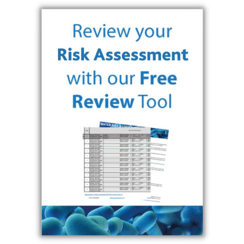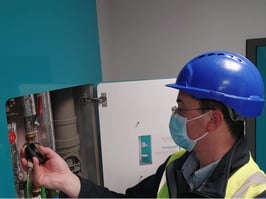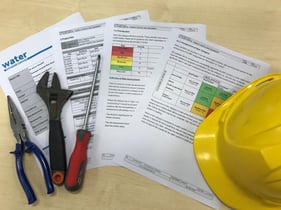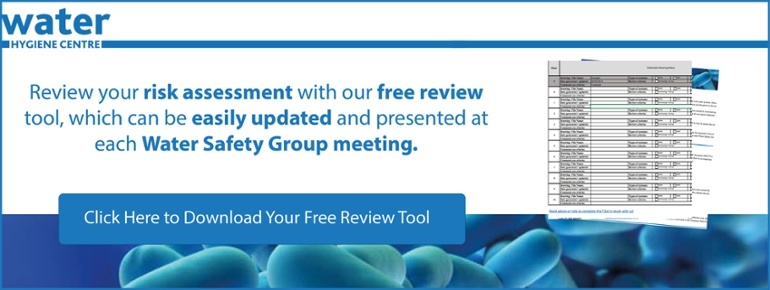Health and Safety regulations and associated guidance require all risks from exposure to Legionella bacteria to be identified and evaluated.
Here, we discuss how “Legionella Risk Assessments” can be undertaken and managed incorrectly, in the form of the 7 deadly sins.
Lust - Why are there different prices for Legionella Risk Assessments?
If a common scope of risk assessment is agreed upon and the specifications are met, why do they vary in price between suppliers?
With organisations’ resources being finite, it is very tempting to opt for the cheapest risk assessment to save precious funds. But be aware, that if a price seems too good to be true, it probably is. Some low-cost Legionella risk assessments are used as a driver to capture follow-up remedial work and this can be where the contractor will re-coup perceived initial losses.
Gluttony - Always agree on the scope
It is vitally important that the Legionella risk assessment scope is agreed at the project planning stage. This will ensure you receive the work you expect and that you are not paying for anything you do not need. Risk assessments can also be “over-specified” leading to money and other resources being wasted.
For example, is it necessary for a risk assessment to take water temperatures from every outlet?
A risk assessor would learn more about a system by examining temperature records over time, (assuming that the equipment used is calibrated and the individual trained) instead of a snapshot at all outlets. An appraisal of sentinel outlets should be performed, temperatures taken at those outlets, then a follow-up investigation of surrounding outlets if temperatures are non-compliant, to find the solution.
Lengthy lists of temperatures are not useful to anyone, whereas identification of problems and appropriate corrective recommendations are, so do not pay for something you already undertake monthly, and that may deplete your hot water system at the same time.
Greed - Why should I separate remedial works?
Too many Legionella risk assessments are stacked with data and numbers, with details of equipment and long lists of assets with no suitable assessment or evaluation included in the report. Whilst “satisfying” you that the assessor has “inspected” everything, the contractor now has all the information they need to cost potential follow-up remedial works. In short, the assessment has become a quoting exercise, a short-term gain for you but a loss in the long run.
Sloth - Legionella Risk Assessment: How often?
 As discussed in the previous blog ‘Risks of not completing a Legionella Risk Assessment at the right time’, a risk assessment is not a “one-off exercise” but a “live document”. Legionella risk assessments should not be deemed a tick box exercise and then shelved, but regularly reviewed and updated as necessary.
As discussed in the previous blog ‘Risks of not completing a Legionella Risk Assessment at the right time’, a risk assessment is not a “one-off exercise” but a “live document”. Legionella risk assessments should not be deemed a tick box exercise and then shelved, but regularly reviewed and updated as necessary.
By using a Legionella Risk Assessment Review tool, you will succeed in determining foreseeable risks, by acting in “anticipation of, rather than in response to changes”.
Wrath - Risk Assessors are there to help
Legionella risk assessments should not be viewed as a critique of you, your organisation or your water systems, neither should a risk assessor be viewed as a hindrance.
 Risk assessors are there to identify and assess your risks, and then propose ways to eliminate or minimise these risks. The more information and help they receive during the assessment survey period, the more accurate and helpful the final risk assessment will be.
Risk assessors are there to identify and assess your risks, and then propose ways to eliminate or minimise these risks. The more information and help they receive during the assessment survey period, the more accurate and helpful the final risk assessment will be.
Do you have all water safety records and assets prepared for inspection?
Have you supplied the risk assessor with a competent escort who is familiar with your water systems?
The Legionella risk assessment is critical to the preparation of the Water Safety Plan / Written Scheme, so the perspective that a risk assessor is there to “help” you and not use up valuable time and resources, will benefit you in the long term.
Envy - Risk Assessments should be specific
What works in one situation, may not work in another.
 A Legionella / Water risk assessment can be extremely generic and may include copied and pasted text from guidance or common recommendations taken from another property’s risk assessment. One should guard against this when initially reviewing a report
A Legionella / Water risk assessment can be extremely generic and may include copied and pasted text from guidance or common recommendations taken from another property’s risk assessment. One should guard against this when initially reviewing a report
A risk assessor will use their knowledge and experience to “make practical recommendations to control any risk identified to ALARP”, however, sometimes you may need to undertake more appropriate, alternative, solutions, that should not discredit the assessor.
Control measures should be specific to that system (not copied from guidance) and proportionate to the actual risks identified. They should also be undertaken based on the views of the personnel involved in the operation and maintenance of the systems in question.
Pride - Listen to advice from the professionals
A Legionella risk assessment is a requirement by law and should not be ignored. They are undertaken by providers with specialist knowledge and experience.
Whilst you may know your water systems better than the assessor does, their advice and recommendations should not be ignored. A risk assessment report is likely to include multiple proposals to help minimise the risk of bacterial growth, even if some of which you may not want to hear.
Whilst identifying water hygiene companies to assist with assessing Legionella risk is relatively straightforward, how can you be sure that their services are fit for purpose and will help to discharge your legal obligations?
The answer, increasingly, is accreditation. The Water Hygiene Centre is one of only a handful of companies within the UK to have gained the UKAS ISO/IEC 17020:2012 accreditation for Legionella Risk Assessments, aiding competency, impartiality and integrity.
What is Legionella Risk Assessment?
Ignore at your peril the advice that risk assessments can quite suddenly become a very important document if the worst should happen.
Feel free to reach out if you have any questions about this blog or if you would like to consult with one of our experts for further advice on water hygiene.
Editors Note: The information provided in this blog is correct at the date of original publication - October 2017.
© Water Hygiene Centre 2019 (Revised December 2023)
Image by Ekkapop Sittiwantana from Pixabay









